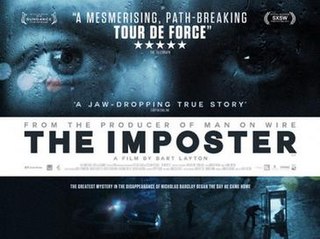Related Research Articles

Identity theft, identity piracy or identity infringement occurs when someone uses another's personal identifying information, like their name, identifying number, or credit card number, without their permission, to commit fraud or other crimes. The term identity theft was coined in 1964. Since that time, the definition of identity theft has been legally defined throughout both the U.K. and the U.S. as the theft of personally identifiable information. Identity theft deliberately uses someone else's identity as a method to gain financial advantages or obtain credit and other benefits. The person whose identity has been stolen may suffer adverse consequences, especially if they are falsely held responsible for the perpetrator's actions. Personally identifiable information generally includes a person's name, date of birth, social security number, driver's license number, bank account or credit card numbers, PINs, electronic signatures, fingerprints, passwords, or any other information that can be used to access a person's financial resources.

Frank William Abagnale Jr. is an American security consultant, author, and convicted felon who committed frauds that mainly targeted individuals and small businesses. He later gained notoriety in the late 1970s by claiming a diverse range of workplace frauds, many of which have since been placed in doubt. In 1980, Abagnale co-wrote his autobiography, Catch Me If You Can, which built a narrative around these claimed frauds. The book inspired the film of the same name directed by Steven Spielberg in 2002, in which Abagnale was portrayed by Leonardo DiCaprio. He has also written four other books. Abagnale runs Abagnale and Associates, a consulting firm.

Martin Guerre, a French peasant of the 16th century, was at the centre of a famous case of imposture. Several years after Martin Guerre had left his wife, child and village, a man claiming to be him appeared. He lived with Guerre's wife and son for three years.

Sommersby is a 1993 period romantic drama directed by Jon Amiel from a screenplay written by Nicholas Meyer and Sarah Kernochan, adapted from the historical account of the 16th century French peasant Martin Guerre. Based on the 1982 French film The Return of Martin Guerre, the film stars Richard Gere and Jodie Foster, with Bill Pullman, James Earl Jones, Clarice Taylor, Frankie Faison, and R. Lee Ermey in supporting roles. Set in the Reconstruction era following the American Civil War, the film depicts a farmer returning home from the war, with his wife beginning to suspect that the man is an impostor.

An impersonator is someone who imitates or copies the behavior or actions of another. There are many reasons for impersonating someone:

James Arthur Hogue is an American impostor who most famously entered Princeton University by posing as a self-taught orphan.
Frédéric Pierre Bourdin is a French serial impostor the press has nicknamed "The Chameleon". He began his impersonations as a child and claims to have assumed at least 500 false identities; three being teenage missing people.

Chameleon Street is a 1989 independent film written by, directed by and starring Wendell B. Harris Jr. It tells the story of a social chameleon who impersonates reporters, doctors and lawyers in order to make money.
Police impersonation is the act of falsely portraying oneself as a member of the police for the purpose of deception.
Michael "Metro" Sabo is an American consultant and speaker on identity theft and fraud in the business and personal sectors. He is executive director of Prison Consultants of America, a resource for individuals charged with white-collar crime. Sabo was a longtime con artist and forger who was released from prison in 2009.
Operation Power Outage was a sting operation targeted at arresting and indicting members of the criminal group Armenian Power operating in the United States. The group is accused of racketeering offenses, bank fraud schemes, kidnappings, and drug trafficking. Armenian Power which originated 20 years ago in East Hollywood and has over 200 members, has developed from a street gang into an international criminal organization.

The Imposter is a 2012 documentary film about the 1997 case of a French confidence trickster Frédéric Bourdin, who pretended to be Nicholas Patrick Barclay, an American boy who had disappeared in Texas at the age of 13 in 1994. The film was directed by Bart Layton. It mainly includes interviews with Bourdin but also with members of Barclay's family, as well as archive television news footage and reenacted dramatic sequences.

The Federal Correctional Institution, Fort Dix is a low-security United States federal prison for male offenders in New Jersey. It is operated by the Federal Bureau of Prisons. A satellite prison camp houses minimum-security male inmates.

A military impostor is a person who makes false claims about their military service in civilian life. This includes claims by people that have never been in the military as well as lies or embellishments by genuine veterans. Some individuals who do this also wear privately obtained uniforms or medals which were never officially issued to them.
Farid T. Fata is a Lebanese-born former hematologist/oncologist and the mastermind of one of the largest health care frauds in U.S. history. Fata was the owner of Michigan Hematology-Oncology (MHO), one of the largest cancer practices in Michigan. He was arrested in 2013 on charges of prescribing chemotherapy to patients who were healthy or whose condition did not warrant chemotherapy, then submitting $34 million in fraudulent charges to Medicare and private health insurance companies over a period of at least six years.

The "Con Queen" scam is a long-running and elaborate scam perpetrated by the so-called Hollywood Con Queen, an Indonesian impostor named Hargobind Punjabi Tahilramani who was eventually found and arrested. The con, which was successfully operated for several years, targets entertainment industry gig workers, who travel to Indonesia believing that they have been recruited to work on the production of a film or television show.
Anthony Enrique Gignac is a convicted American (Colombian-born) fraudster and con artist. In a career spanning 30 years, Gignac used wealthy, high-ranking personas, most notably that of Saudi prince Khalid bin Al Saud, to fraudulently secure investment in a series of schemes that he presented as being backed by a large personal fortune. After defrauding funds of $8.1 million from investors, Gignac was arrested in 2017 after billionaire Jeffery Soffer, the owner of the Fontainebleau Hotel, became suspicious of the supposed Muslim prince ordering pork at a restaurant. He was jailed for over 18 years in 2019.
References
- ↑ Chameleon Street"Extraordinary, fictionalised account of real-life Michigan conman William Douglas Street which won the Grand Prix award at Sundance in 1990." British Film Institute.
- ↑ Game may be up for 'The Great Imposter' By Robert Snell, The Detroit News, June 4, 2015, updated 8:51 a.m. ET June 5, 2015
- ↑ Notorious Detroit con man’s life of fraud finally catches up with him News.com.au (Australia), June 9, 2015
- ↑ Willie Horton's Wife Gets Imposter's $200,000 Note Jet magazine, April 15, 1971, p. 28
- ↑ Detroit's notorious impostor convicted — again By Tresa Baldas, Detroit Free Press, Sept. 24, 2015.
- ↑ Detroit's notorious impostor gets 3 years prison By Tresa Baldas , Detroit Free Press, Feb. 8, 2016
- ↑ Impostor who once conned his way into Detroit Tigers tryout faces sentencing By Khalil AlHajal, Mlive, February 4, 2016, updated on February 8, 2016
- ↑ True Crime: Doug Street, Human Chameleon Mentalfloss.com, by Kara Kovalchik, August 6, 2008
- ↑ Black Listed The New Yorker, August 12, 2008
- ↑ Cinemad interview with Director Wendell B. Harris, Jr. Confirms that Street "proceeded to perform 36 hysterectomies at a Chicago hospital without getting past high school, let alone medical school."